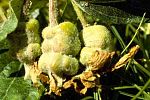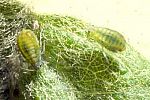Apple Grain Aphid (Aphids)
General Description
Hosts
Apple, pear, quince, plum, chokecherry, hawthorn, dogwood, and grasses.
Damage
On rare occasions may cause fruit injury similar to that caused by apple aphid (Fig. 1)
 |
| Figure 1. Apple fruitlets damaged by apple grain aphid feeding. (H. Philip) |
Identification
Egg - Shiny dark green, oval.
Immature - Initially dark green, becoming lighter green, up to 1.8 mm long.
Adult - Light green with a dark green stripe down the back, light coloured legs, 2 mm long (Fig. 2).
 |
| Figure 2. Apple grain aphids. (BCMA) |
Life History
Overwintering eggs on upper twigs and branches hatch when buds open in the spring. There are several generations produced before winged adults appear and move to grasses and grains for the summer. In the fall, adults return to apples and produce a generation that lays overwintering eggs.
Monitoring
Inspect trees in the spring to identify the aphid species present.
Management
Biological Control
Apple grain aphids are attacked by early season parasitic and predatory insects that will remain to feed upon later appearing, more damaging aphid pests.
Chemical Control
Chemical control is rarely needed. They provide food for early-season predatory insects and parasites.
